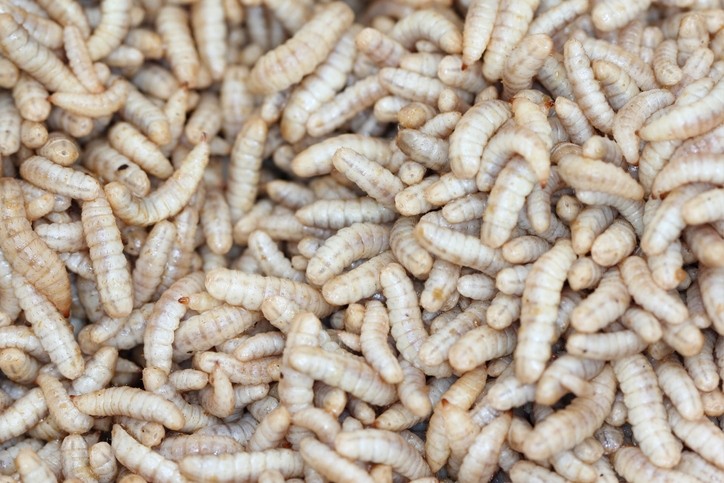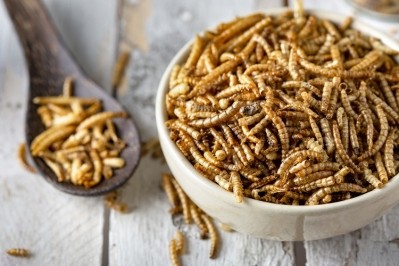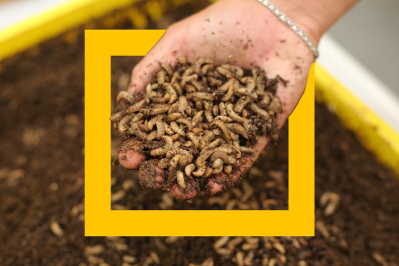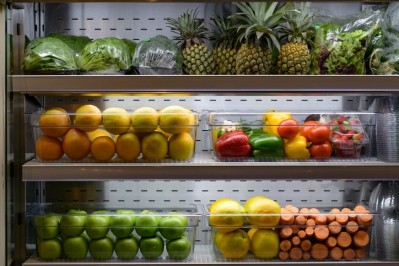‘It has the potential to improve sustainability across the supply chain’: UK mulls regulatory changes to allow insects to eat your food waste

Regulatory change is needed in the UK, according to scientists, to allow the food industry to take advantage of an as yet untapped method of converting food waste into animal feed via insects.
Waste can often end up in landfill and release harmful greenhouse gasses into the atmosphere as it breaks down.
But the process of insect bioconversion (whereby insects, typically Black Soldier flies, essentially live, eat and breed on food waste) can cut volumes, and therefore associated emissions, by between 50 and 75%. That’s according to Fera Science, which has revealed details of a new research project commissioned by the Food Standards Agency which may lead to rule changes to accelerate the use of insect bioconversion in the food industry.
Fera, based at the York Biotech Campus in the north of England, has taken four different food industry waste streams: catering waste from the kitchens of restaurant chain Nando’s; mixed food waste from supermarket Morrisons; largely bakery waste from food processor Cranswick; and poultry manure sourced from Oakland Farms in Yorkshire.
As well as helping food businesses manage their environmental impact, the Fera team claim insect bioconversion can open valuable new revenue streams for businesses. For example, the larvae are harvested to produce insect protein and other valuable co-products such as oils and chitin. The waste produced by the bioconversion process itself, known as frass, has potential as a soil improver and fertiliser.
“Oils can be used to create biodiesel and the chitin can be processed into chitosan film which can be used as a sustainable food packaging alternative,” explained Dr Maureen Wakefield, Principal Scientist and FSA research project lead for Fera. “However, many other co-products using these items have potential and are under investigation.”
But there’s a bottleneck preventing the widespread use of insect bioconversion in the food industry.
Currently, only materials that contain products of non-animal origin (such as vegetal matter, residue from fruit and vegetable processing and brewery by-products and some products of animal origin such as milk, eggs and their products) are allowed be used as a waste stream on which to breed and feed insects.
Tight regulation instigated following BSE also means insects are classified as ‘farmed livestock’ so the protein generated from the larvae are not approved for processing and placing in the feed chain. The only current allowable use in the UK is the feeding of the whole larvae to poultry.
The new FSA research has the potential to widen the waste streams which can be used for insect bioconversion to include catering waste, mixed food waste, and bakery waste and manure, explained Dr Wakefield, hence the involvement of Nandos, Morrisons, Cranswick and Oakland Farms in providing the four mixed wastes for use in the research.
“Our research project for the FSA has the potential to deliver a significant step forward in realising the potential of insect bioconversion to manage sustainably a range of widely available mixed wastes that are currently not permitted for use due to the presence of animal by-products. Our research utilising these four waste streams is examining whether there are risks to utilising these for insect bioconversion.”
The project will provide the FSA with data for a risk assessment, which is required to determine whether there could be scope for a regulatory change. A final report is expected to be provided by Fera to the FSA at the end of 2023.
“Such a regulatory change could boost efficient management of such wastes as well as generating a sustainable source of animal feed and other valuable co-products," Dr Wakefield added.
The buzz around insect bioconversion
The companies to have supplied waste to Fera’s project agreed the innovation offers significant scope to reduce their environmental impact.
George Roach, Director of Oakland Farms Limited, said black soldier fly production has huge potential for reducing reliance on imported soyabean meal. “But for this to be viable it has to be using a true waste stream such as poultry manure, not, as is currently the case, feedstocks that could be going directly to human and animal feed. When this is coupled with the possibility for added value through the bioconversion of poultry manure into a more nutrient dense fertiliser, I could not have been happier to help by supplying one of the waste streams, namely poultry manure.”
Sam McCarthy, Head of Sustainability at Nando’s, said the project “could provide a productive and sustainable new use for a waste stream and the possibility of evolving our chicken feed in the future.”
Sophie Throup, Technical and Sustainability Director for Morrisons added: “Over the last few years, we have been taking food waste that is perfectly safe to eat but unable to be redistributed and use it to feed black soldier fly larvae. The fly larvae are then fed to laying hens in our supply chain to help remove soya from their diet which has been a huge environmental milestone.
“We already share an interest in circular energy chains and how they work practically but we're keen to understand whether it is possible for food waste to be safely used to create 'usable' calories for our livestock feed, and introduce an alternative to sending food waste to anaerobic digestion facilities.”
Dr Maureen Wakefield of Fera concluded: “It is essential that a full investigation is carried out on all potential risks from the waste streams as well as from the larvae and the frass, as the ultimate destination of increased uptake of the novel technology of IB is likely to be the human food or livestock feed chain and fertiliser for plants.
“Thanks to the collaboration of all our partners in the project from industry, food and academic sectors, we are able to provide ‘real world’ data driving forward our scientific knowledge on IB and on which policies can be reviewed and developed particularly by the FSA.”
























